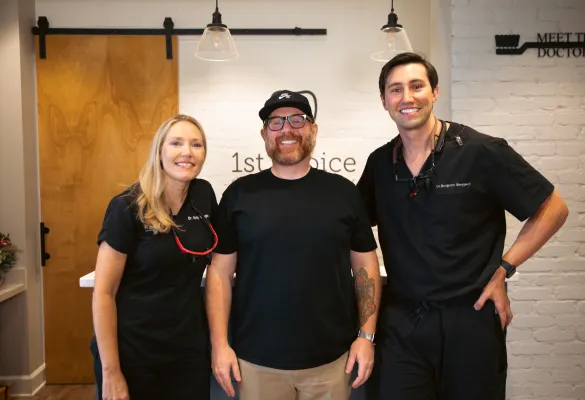What Are
Dental Implants
Lifelike Appearance and Function
with the Highest Quality
Dental implants are small titanium posts that replace the roots of missing teeth (View Example). They are inserted into your jawbone and are made from a surgical grade inert material. Inert means you won't be setting off any alarms at the airport. After the implant has been placed, a natural lifelike porcelain tooth crown is attached. In some cases, the implant needs to fuse with the bone for several months before it is permanently crowned; in other cases, you can have new (but temporary) teeth the same day your implants are placed. The treatment time varies based on bone quality and quantity. The best thing about an implant is it's the next best thing to your natural tooth! Floss it and brush it just like your own. It not only looks and functions like a natural tooth, but it helps support the bone in your jaw. Just like weight bearing exercise promotes healthy bones; teeth in function help promote healthy jawbone.

Dental Implants
Common Questions
How many teeth can be replaced with dental implants?
You can replace a single tooth, multiple teeth or all your teeth with implants (View Examples). You don't even need one implant for every missing tooth. Home of the Stay Put Denture, for dentures that stay put! With Stay Put Dentures, as few as two Implants can support a removable lower denture, while as few as four to six implants can provide a full, permanent set of teeth with Restore in 24. There are so many options available your best bet is to visit the dentist and based on your specific needs, come up with the best solution for you and your budget.
Is dental implant surgery painful?
Most people find dental implant surgery very easy to tolerate. Any post-operative discomfort can usually be managed with over-the-counter (OTC) anti-inflammatory medication such as ibuprofen or OTC pain-relievers.
How do you care for dental implants?
They require exactly the same care as natural teeth: daily brushing and flossing, along with regular dental checkups and professional cleanings. Although implant teeth will never decay, the gum tissues around them can become inflamed or infected in the absence of good oral hygiene. Properly cared-for dental implants should last a lifetime.
Can my body reject a dental implant?
Strictly speaking, implants can't be rejected because they contain no living cells or genetically coded material. The titanium of which they are made is completely biocompatible, and allergies are extremely rare. But an implant can fail to integrate with the jawbone if an infection develops in the absence of good oral hygiene, or if it is subjected to biting forces too soon. However, this is rare; implants regularly achieve success rates in excess of 95%.
Are dental implants expensive?
Dental implants are not always the least expensive option, but they are usually the best long term option. Implants offer so many benefits and their long term success is over 97%. They also help prevent bone loss and the need to remove healthy tooth structure of neighboring teeth. So while there may be more up front cost, they offer the best, most cost-effective option when viewed as a long-term investment in your health, comfort, and well-being. Our All-Inclusive pricing (without insurance) is $2499 per implant.* This includes the implant, custom abutment and crown. This is for a single implant and crown, but there are other all-inclusive options if there is a need to replace multiple teeth or all teeth.
*For patients in good health, single-stage implant. Cannot be combined with insurance.
Am I a candidate for
dental implants?
There's a good chance that you are, but this can only be determined after a complete oral examination that includes x-rays of your jaw to evaluate the quality and quantity of bone. We offer a complimentary implant consultation including necessary images to determine if you are a candidate. Please schedule a consultation to begin the exciting process of restoring your smile and bite.

